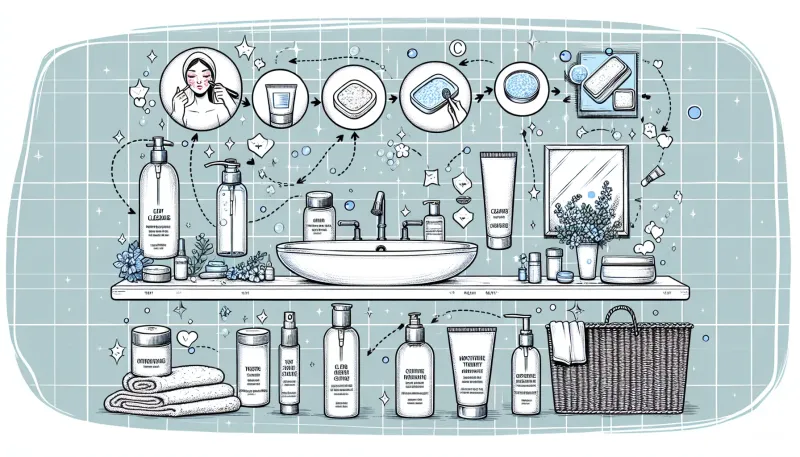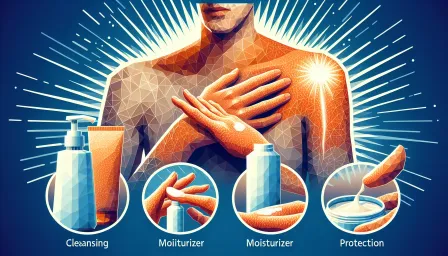The Ultimate Fungal Acne Skincare Routine: Clear Skin Tips

Discover the ultimate fungal acne skincare routine with tips and solutions to achieve clear skin. Expert advice on managing and preventing fungal acne.
Introduction
Fungal acne, also known as Malassezia folliculitis, is a common yet often misunderstood skin condition. It mimics regular acne but is caused by an overgrowth of yeast in hair follicles rather than bacteria. This unique origin requires a specialized fungal acne skincare routine to effectively address and manage the condition. In this article, we will explore a comprehensive routine to help you achieve clear skin and maintain it.
Understanding Fungal Acne
To tackle fungal acne, it's essential to understand its underlying causes and symptoms. Fungal acne is typically characterized by small, uniform pimples that are often itchy. Unlike bacterial acne, it does not usually have blackheads or whiteheads. The excess growth of the Malassezia yeast, which thrives in oily and humid environments, leads to this condition.
Key Components of a Fungal Acne Skincare Routine
1. Gentle Cleansing
Cleansing is a vital first step in any skincare routine. For fungal acne, use a gentle, non-comedogenic cleanser that can effectively remove excess oil and impurities without stripping the skin of its natural moisture. Look for cleansers containing salicylic acid or benzoyl peroxide, which can penetrate pores and reduce yeast growth.
2. Exfoliation
Exfoliating your skin helps remove dead skin cells and prevent pore blockages, which can exacerbate fungal acne. Opt for chemical exfoliants containing alpha-hydroxy acids (AHAs) or beta-hydroxy acids (BHAs). These ingredients provide a gentle yet effective exfoliation without irritating the skin.
3. Antifungal Treatments
Incorporating antifungal treatments in your routine can directly target the yeast causing fungal acne. Over-the-counter products containing ingredients like ketoconazole, clotrimazole, or miconazole can help. Apply these treatments as directed, focusing on the affected areas.
4. Moisturizers
Keeping your skin hydrated is crucial, even if you have fungal acne. Choose oil-free, non-comedogenic moisturizers that contain soothing ingredients like niacinamide or hyaluronic acid. Avoid heavy creams or ointments that can create a breeding ground for yeast.
5. Sun Protection
Sun exposure can worsen fungal acne, so daily sun protection is non-negotiable. Use a broad-spectrum sunscreen with at least SPF 30. Opt for formulas that are lightweight, oil-free, and non-comedogenic to avoid clogging pores.
6. Avoiding Common Triggers
Identifying and avoiding common triggers can help manage and prevent fungal acne outbreaks. Some triggers include excessive sweating, prolonged wearing of tight clothing, and using skincare products with high oil content. Ensure your makeup and hair care products are also free from pore-clogging ingredients.
Additional Tips for Managing Fungal Acne
Beyond the essential components of a fungal acne skincare routine, there are other strategies you can implement to keep your skin clear and healthy:
1. Diet and Lifestyle
Diet can play a significant role in managing fungal acne. Reducing the intake of high-sugar and high-carbohydrate foods may help, as these can promote yeast overgrowth. Incorporate more fresh vegetables, lean proteins, and whole grains into your diet. Additionally, staying active and maintaining good hygiene practices can reduce the risk of fungal acne.
2. Consistency is Key
Consistency is crucial for any skincare routine to be effective. Sticking to your routine and giving products enough time to work will yield better results. Avoid switching products frequently, as this can irritate your skin or exacerbate fungal acne.
3. Seek Professional Help
If your fungal acne persists despite following a proper skincare routine, consider consulting a dermatologist. They can provide personalized advice and may prescribe stronger antifungal medications if necessary.
Conclusion
Fungal acne requires a tailored approach that addresses its unique causes. By following a dedicated fungal acne skincare routine that includes gentle cleansing, regular exfoliation, antifungal treatments, and proper hydration, you can manage and prevent outbreaks effectively. Remember, consistency and patience are critical, and professional guidance is always a valuable asset in achieving and maintaining clear skin.



























